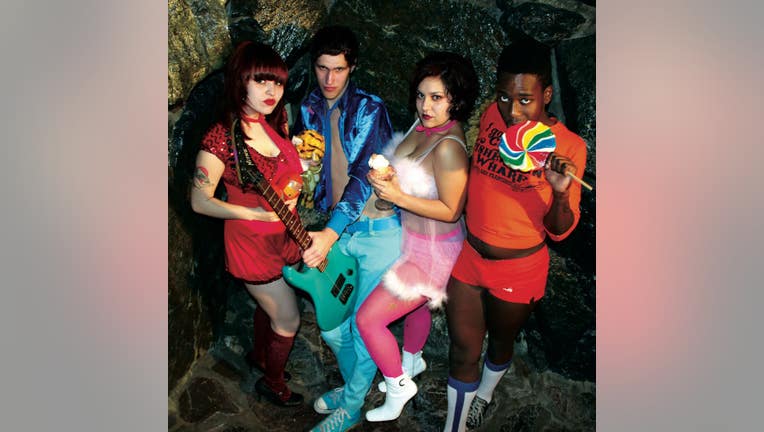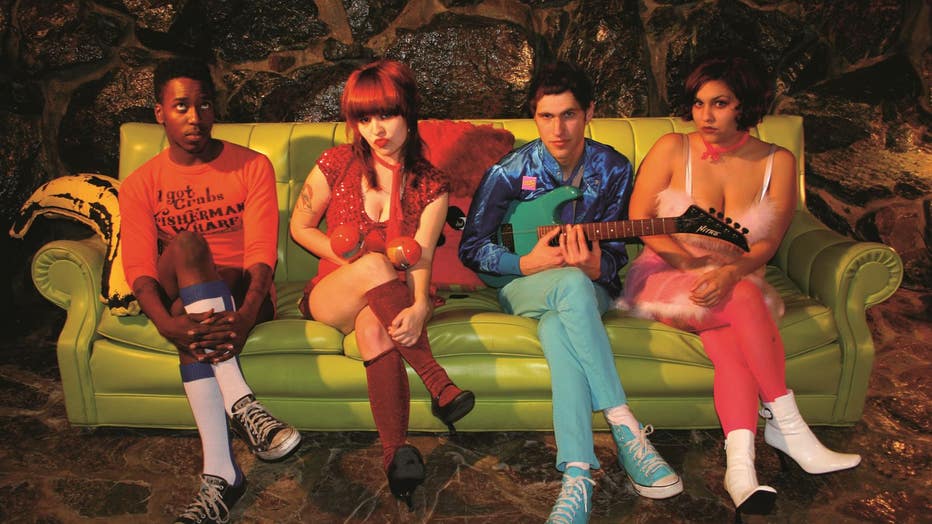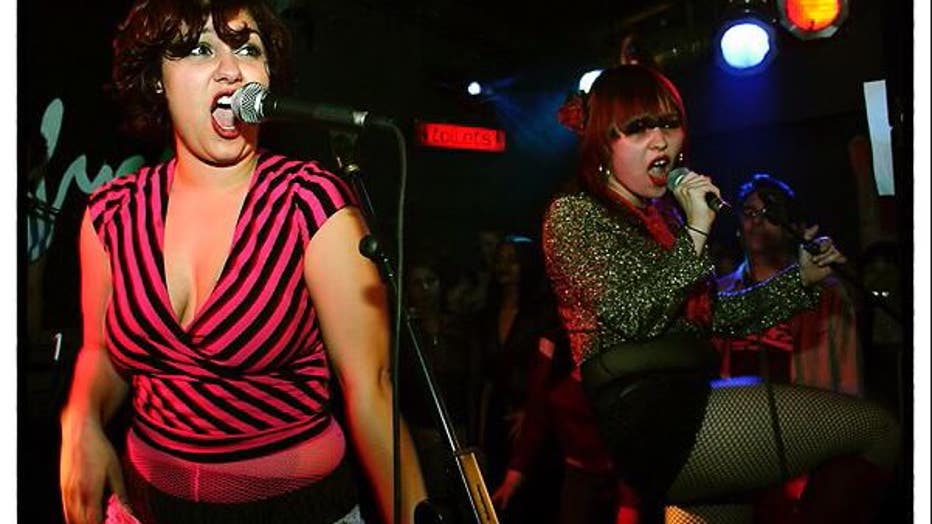What’s a Gravy Train!!!!? Guess you had to be there

Gravy Train!!!! from the early 2000s.
OAKLAND, Calif. - What's a Gravy Train!!!! you ask? Why all the superfluous exclamation points? The short answer is: a joyful expression of feminist, queer excess.
Anyone who had their finger on the pulse of the Bay Area indie and underground music scene in the early 2000s, may already know. But if you missed the band with the exuberant name the first time around, you now have a chance to see what the excitement was all about.
This week it was announced that the group is reuniting and playing their first show in about 13 years. It will take place at Oakland's Mosswood Meltdown in July 2023. That's a ways off, but early-bird tickets are available this week for this anticipated show hosted by the iconic filmmaker, John Waters. The first-wave lineup announcement reads like a wave of feminism with acts like Le Tigre at the top of the bill, and accompanying sets by Tina and the Total Babes, and The Rondelles.
Gravy Train!!!! started in 2001 as a "novelty rap and dance troupe," says Heather Jewett, the lead singer of the Oakland group.
Imagine notoriously wild Oakland warehouse dance parties with synth, beats and debauchery.
Fans of the East Bay music scene are likely already familiar with Gravy Train!!!!'s individual members who went on to solo success. Seth Bogart, of Hunx and His Punx fame, eventually moved from the Bay to So-Cal where his Wacky Wacko boutique and online shop flourished. That's where he sells his wares, mostly original screen-printed designs with a campy flair. Another band member, Brontez Purnell, went on to form The Younger Lovers. He's a provocative storyteller, a published author, and an artist who founded his own dance company. Carolina Garza, who also played in the band, has remained in the Bay Area.
But the scrappy origins of Gravy Train!!!! are rooted in vengeance, specifically against men. "It's purpose was to get revenge on a guy who I was mad at," says Jewett, reflecting on the band's creation. "It turned into a touring band for the next eight years."
Now based in Los Angeles, she looks back on those early days and the band's impact on that generation and the local music scene. She says the band was a celebration among friends. "I was 20. We were trying to be as bratty, wild and shocking as possible."
Describing Oakland back then as an artistic "free-for-all," Jewett yearns for the magical land where they'd drink 40s and create art. "We were away from parents for the first time. If I'm being super honest, it was before everything was super gentrified when we moved there. But I do acknowledge, we were part of a wave of gentrification by being there."
Despite having a Black and Latinx member, she says there was negligence on her own part as a white person rapping in Oakland, "setting up shop, taking what we wanted" from a previously existing culture. But as much as this time was coming of age for the group, it was the same for their fan base.

Promo photo of Gravy Train!!!! from the early 2000s. The Oakland band is reuniting for a performance at the Mosswood Meltdown, hosted by John Waters.
"We played at parties. Our first show was in my living room," she says. The band's first "real show" was at Kimo's, a relic of San Francisco Polk Street gay nightlife. Other gigs were in Oakland warehouses and punk clubs.
As the wave of riot grrrl feminism, embraced by their record label, Kill Rock Stars, receded, Gravy Train!!!! was there to fill the void and they connected with their audience. Picking up where associated acts; Sleater Kinney, Bikini Kill and Bratmobile left off, they had something new to say.
"We immediately found our fan base," says Jewett. "Our audience was queer kids."
At first, she says she felt guilty looking back at how young some kids were when they were attending their shows. Someone once told her, "I was 11 sneaking into your shows." She felt bad about the free-for-all of sex and drugs they may have been exposed to. "It's weird to think of kids that young being into it. The damage is done," she says half joking.
So what about all that notoriety? For better or for worse, there is video on YouTube of stage antics like Jewett crushing beer cans with her "boobs," but the wildest thing? Performing sex acts on stage? She recalls maybe a band member "dry-humping" once or twice. "It was cartoonish," she says. "It was exaggerated."
To give some context, by the early 2000s, rap had long gone mainstream. The era of the hip-hop mogul was in full swing, but music was also coming out of the recent shock-rock antics of performers like Marilyn Manson. Gravy Train!!!! had to really put themselves out there if they wanted to stand out.
Gravy Train!!!!, arguably just as crude as their predecessors, explored and celebrated sexual freedom. You can hear part of that devil-may-care attitude on their first release, ‘Hello Doctor', from 2003 on the KRS label.
SEE ALSO: Phuong Tam's daughter discovers mother's past as 'Vietnam’s first rock star'
"We played with everyone; from queer electro bands to punks."
They've shared bills with the heavily-sampled, South Bronx funk band, ESG. They've even opened for the Go-Gos. By the time they broke onto the scene, the electroclash genre was sweeping the East Coast. "Everyone wanted to let their freak flag fly in this way,"

Gravy Train!!!! during live performance. Photo by SonicMoO.
Pitchfork, the so-called authority when it comes to music industry reviews, only gave them a 2.9 out of 10, but Jewett doesn't let that influence her much. They weren't wrapped up in ideas of success or clout.
"As I become older, I've become more self-critical. With social media, everything is immediately criticized. It amplifies the pressure."
If social media had existed in the Gravy Train!!!! era, Jewett quips "People would be talking like us" and that they'd be "heavily meme-able."
"We had our own language," she says. "What I missed the most is the laughs we would have on tour." She recalls the group as "four of the funniest people, ever." But by 2022 standards, she admits they'd "probably be canceled a million times over."
After Gravy Train!!!!, Jewett went back to school for screenwriting. Film school and the industry in general proved difficult. She describes being jaded after school and learning quickly about the power of industry gatekeepers.
"I missed the DIY (do-it-yourself) process of punk rock. You can make a movie, but it needs funding. Gravy Train!!!! showed up, did what we wanted. We didn't have to compromise our vision. We didn't have to wait."
At the Mosswood Meltdown, Jewett gets to revisit some of her original creative vision through a more mature set of eyes and an evolved landscape in the music industry.
"I’m so f-ing excited. I’m happy to know the bill is fem energy. If this is the response and a garage-rock fest turns into riot grrrl fest, I have no complaints with that."

